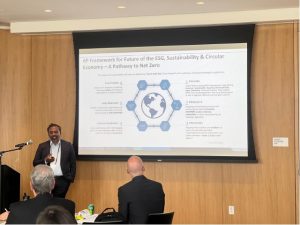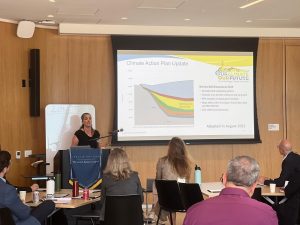World Environment Day and Frost & Sullivan’s 6P Framework
World Environment Day (WED) is celebrated on June 5th every year, and the themes for this year were land restoration, halting desertification and building drought resilience, all as part of a broader theme, “Our Land Our Future.” We are Generation Restoration.
To help meet the sustainability challenges ahead, Frost & Sullivan recently launched a 6P framework, shaped by the pathway of Policies to Platforms. It is designed to help transform the future of Environmental, Social and Governance (ESG), Sustainability, and the Circular Economy, a system based on the reuse and regeneration of materials or products. The 6P’s stand for Policies, Products, Processes, People/Personas, Partnerships and Platforms. This framework also highlights the critical role of technology to drive the three S’s of digital: sustainability – scale, speed and savings.

Innovation Workshop & Tour Takeaways
I recently spoke at Frost & Sullivan’s Innovation Workshop & Tour hosted at UC San Diego. The event theme, Innovating for Sustainability, provided an opportunity to discuss the relevance of the 6P model as an industry agnostic framework for delivering “more with less.” My presentation included a guide to policies, processes and synergies that can influence the design and development of more sustainable products, and opportunities around carbon reduction and resource optimization.
Here are just a few of the insights and strategies shared by other thought leaders at this highly informative event:
Jennifer Brace – Chief Futurist at Ford Motor Company, kicked off the workshop with a
keynote on Preparing for the Future of Sustainability. Jennifer highlighted the importance of both outside-in innovation and understanding customer personas when creating sustainable programs and practices.
According to Brace, there are six core tenets of being a futurist:
- Preparation is more important than prediction
- Watch for outliers
- Be provocative
- Balance provocation with plausibility
- Embrace uncertainty
- Imagine multiple versions of the future
Kelsi Doran, Director of Sustainability at Cisco, addressed the need to tackle our carbon footprint and enhance our handprint – positive and tangible sustainability actions and projects) – especially in the context of AI. As shared, AI brings the potential to scale sustainability initiatives, but it also consumes a tremendous amount of energy. To address this, we’ll need to modernize, digitize and secure grids to provide the energy necessary to fuel AI. We’ll also need to drive innovation to optimize efficiency and invest in renewable energy.
Dr. Nikola Juhasz – Global Technical Director – Sustainability, at Sun Chemical, highlighted the challenges and opportunities of influencing sustainability from the upstream segment. She discussed emerging practices such as working with suppliers to give guidance on preferred raw materials, focusing on reducing or eliminating emissions, and assessing the impact of different product solutions with packaging formats… just some of the ways to enable a more sustainable and circular environment.

In her Fireside Chat – Show Me the Money: Investing in Sustainability for Innovation, conducted with David Szmigielski, Executive Director and Senior Lead Investment Banker, Sustainable Finance & Advisory, Wells Fargo Corporate & Investment Banking, Rebecca O’Neill, Global Head of Sustainability at Marvell Technology, discussed her organization’s consortium-driven approach to crafting sustainability initiatives. The company partners across businesses to make the case upstream.
O’Neill advised participants to explore how to forge sustainability coalitions in their own organizations. Ask: What are the most material issues? What are the risks and opportunities? How do they sit in the value chain? How do we influence them? O’Neill encouraged participants to identify key stakeholders and to bring in all different aspects of the business to formally and informally engage. Then, co-create initiatives, KPIs and targets.
Other notable thought leaders including Kevin Reyer, Program Manager for Sustainability at Millipore Sigma, who highlighted the company’s “Design for Sustainability” Program and Russ Schneidewind – Director of Business Development at HydraForce, Inc., who discussed the B2B drivers of sustainability, rounded out a day of keen insights and learning.
A special thank you to Paul Roben, Ph.D. Associate Vice Chancellor, Innovation & Commercialization at UC San Diego, for hosting us in the university’s state-of-the-art Design and Innovation Building.
Fredrick Royan currently leads the Sustainability and Circular Economy Practice at Frost and Sullivan, covering research and consulting in water and wastewater treatment technologies, waste recycling and related service markets. As a leader in the sustainability field with more than two decades of experience, he brings together a system-thinking and data-driven approach to tackling some of today’s most complex sustainability challenges.


Recent Comments